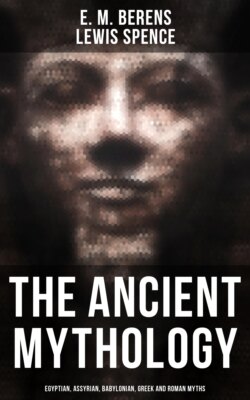Читать книгу The Ancient Mythology: Egyptian, Assyrian, Babylonian, Greek and Roman Myths - Lewis Spence - Страница 49
На сайте Литреса книга снята с продажи.
Bel and the Dragon
ОглавлениеThe picturesque legend of Bel and the Dragon which appears in the Apocrypha, and which was at one time appended to the Book of Daniel, shows us the manner in which Bel was worshipped at Babylon, and how he was supposed to take human shape, devour food, and behave very much as a man might. The legend states that the Babylonians lavished every day upon the idol of Bel twelve great measures of fine flour, and forty sheep, and six vessels of wine. King Cyrus of Persia, who had overthrown the Babylonian kingdom, went daily to worship Bel, and asked Daniel why he did not do likewise. The prophet replied that his religion did not permit him to worship idols, but rather the living God who had created the heavens and the earth.
"Then said Cyrus: 'Thinkest thou not that Bel is the living God? Seest thou not how much he eateth and drinketh every day?'
"Then Daniel smiled and said, 'O King, be not deceived, for he is but clay within and brass without, and can never eat or drink anything.'
"Cyrus was exceeding wroth, and calling for his priests said to them, 'If ye tell me not who this is that devoureth these expenses ye shall die, but if ye can show me that Bel devours them Daniel shall die, for he hath spoken blasphemy against Bel;'" and to this Daniel cheerfully agreed.
It would have been surprising had not the provisions vanished, because we are told that the priests of Bel were threescore and ten in number and had numerous wives and children. So Cyrus and Daniel betook themselves to the temple of Bel, and the priests asked them to bless the meat and wine before Bel, and to shut the door fast and seal it with the King's own signet, stating that if they came on the morrow they would find that Bel had eaten up all of the provisions.
But they had taken good care to protect themselves, for they had made a secret entrance underneath the great table in the temple which they used constantly, so that they might consume the good things that were set before the idol.
And Cyrus did as the priests asked, setting the meat and wine before the statue of Bel, but Daniel commanded his servants to bring ashes, which they strewed throughout the temple in the presence of the King; then they went out and shut the door and sealed it with the King's signet.
And in the night time the priests with their wives and families entered the temple by the secret way and speedily consumed the provisions.
In the morning Cyrus and Daniel betook themselves to the temple, and the King broke the seals and opened the door, and when he perceived that all the provisions had vanished he called out with a loud voice, "Great art thou, O Bel, and with thee is no deceit at all."
But Daniel laughed, and barring the King's way into the temple requested him to look at the pavement and mark well whose footsteps he saw there.
And Cyrus replied, "I see the footsteps of men, women, and children."
He at once called the priests, who when they saw that their stratagem had been discovered showed him the secret way into the temple; and in his rage Cyrus slew them and delivered Bel into Daniel's power. The prophet speedily destroyed the idol and the temple which sheltered it.
Now in that temple was a great dragon worshipped by the people of Babylon, and the King said to Daniel: "Wilt thou also say that this is of brass, for behold! he liveth, he eateth and drinketh, therefore shouldest thou worship him!"
But Daniel shook his head and said to Cyrus: "Give me leave, O King, and I will slay this dragon without sword or staff."
Then Daniel took pitch and fat and hair and boiled them all together, and shaped them into great pieces. These he placed in the dragon's mouth, and shortly the dragon burst asunder.
Now the people of Babylon became greatly incensed at these doings and clamoured to Cyrus, asking him to deliver Daniel up to them, or else they would destroy him and all belonging to him. And, continues the legend, Cyrus being afraid for his crown delivered Daniel to the people, who cast him into a lions' den where he remained for six days. Seven lions were in the den and their food was removed from them so that they might be the fiercer, and the Apocrypha story, which differs considerably from that given in the sixth chapter of the Book of Daniel, states that the angel of the Lord took up a certain prophet called Habbacuc, who was about to carry a mess of pottage to certain reapers, and taking him by the hair of the head, conveyed him all the way from Palestine to Babylon along with the food, which he set at Daniel's feet. Daniel partook of the meal, and Habbacuc was conveyed back to Palestine in the same manner as that in which he had come.
And on the seventh day Cyrus came to the den to mourn for Daniel, and when he looked in Daniel was there. So impressed was Cyrus with the power of Daniel's God that he resolved to worship Him in future, and seizing those who had been instrumental in casting the Hebrew prophet into the den, he thrust them before the lions, and they were devoured in a moment.
